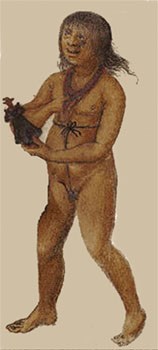In which I continue my adventures in 17th -century Virginia.
I venture into the Powhatan Indian village looking for a young Pamunkey girl named Pocahontas. I heard she was very lively and fun. She is gone now but her people are still here. Let's walk through the village and learn about Powhatan life.
 |
| The Indians burned and hollowed out canoes for water travel |
When the English settlers arrived (before my family came here), there were thousands of Eastern Woodland Indians occupying the coastal plain of Virginia. Their ancestors had lived on the land for centuries before that. There are 32 loosely related tribes. Pocahontas's father, Wahunsonacock, or Powhatan was a powerful chieftain. Each tribe is led by a man (werowance) or woman (weowanquas). They live separately but share religious beliefs and cultural traditions.
 |
| Powhatan Village |
Women farm and raise children. The Powhatan, as we English call them, are a matrilineal tribe. This means women pass on the traditions to children along with kinship and inheritance. When the children marry, their mothers and aunties go over the family tree to make sure the couple are not related.
Everyone paid a tribute tax to the local rules and the local ruler paid tribute to Powhatan (or other chieftain). Tributes can be skins, shell beads, copper or corn. In return for the tribute, the people get protection from the ruler.
 |
| Skins piled up |
This is a Powhatan house like the one Pocahontas lived in as a girl. It is called a yehakin. It is made from saplings of local trees like red maples, locusts and red cedar. The frames are covered with bark or marsh reed mats.
 |
| Inside a yehakin |
 |
| yehakin walls |
Houses were built along the banks of large rivers and major tributaries. Like our villages, houses are near planting fields. The Powhatan move whenever the fields don't grow food anymore. The Powhatan plant, hunt, fish and gathering according to the seasons. They raise vegetables like corn, beans and squash.
 |
| Powhatan village |
Corn is a common food. They grind the corn to make into flat cakes or boil it in a stew with beans, squash, wild game or fish. In summer and fall they eat fresh vegetables; in spring fish, berries and stored nuts make up the main diet. They can gather oysters and clams when food is scarce during winter. In winter they also hunt and eat game including raccoon, deer, opossum, turkey, squirrel and rabbit.
 |
| common foods include corn, beans, oysters, clams, and nuts |
Deer are used not just for food but also clothing and tools.
 |
| Preparing deerskin |
 |
| Reusing the deerskin |
Opossum? Raccoon? What is THAT? How strange. I heard many English people were starving before we arrived. I suppose eating such game would taste fine if one were starving but I do not wish to eat such odd New World creatures.
What did children do? While men hunted, fished, made tools and cleared land and grown women farmed, gathered firewood, made clothing, prepared and served meals, the children helped their parents. Girls had to weed gardens. Nothing different from our village! I help my mother weed the garden, prepare and serve meals too. Indian children like Pocahontas also play games. She was said to be a prodigious runner. Some children may also be put in the middle of the corn fields to act as a scarecrow to keep animals from eating the corn.
These Indians are scarcely dressed. I blush when I see them. The children run naked until they are my age or a bit older!
 |
Young native child
from the British Museum |
The Indians have a curious custom of painting their bodies and piercing their skin to make designs. They smell oddly of bear fat. The women chieftains and other wealthy women wear ornaments around their necks and in their ears.
This is the life Pocahontas knew.
Read more:
Who were the Powhatan Indians and how did they live?
Pocahontas: Her Life and Legend










No comments:
Post a Comment